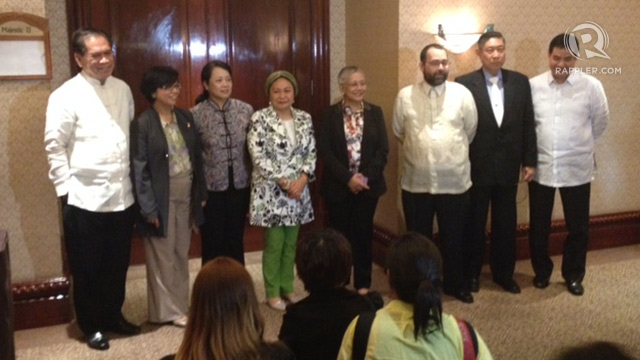This is a developing story.
Both sides on
Saturday, January 25, agreed on a historic firearms deal that would require the
rebel group to gradually decommission their firearms in phases.
It is the last
document needed to be settled before the comprehensive peace agreement can be
signed.
As of this
writing, members of the MILF panel remained in a caucus with lawmakers.
Under the annex
on normalization, the MILF agreed to "decommission" a specific number
of their firearms and troops in certain periods as the government, in exchange,
also gave its commitment to reduce armed forces and help disband private armed
groups in Mindanao .
The MILF, however, said they will not "surrender" their firearms to
the government. Instead, a third-party group will handle the inventory of MILF
firearms and their troops. Ahead of the signing, government peace panel member
Yasmin Busran-Lao told reporters an indepedent commissioning body that will
recommend the most appropriate mechanism on how to store the arms will be
created after the signing.
The deal is a key
difference compared to the 1996 peace pact between the government and MILF's
rival group, the Moro National Liberation Front (MNLF), which did not require
MNLF troops to lay down their firearms.
Both sides also
agreed to design socio-economic programs for MILF troops who will no longer
engage in war, as transitional justice mechanisms are put in place.
Once the
comprehensive peace agreement is signed, MILF chief negotiator Mohagher Iqbal
earlier said the MILF will stop using its arms and start its transformation
towards becoming a "social movement." (READ: What happens to MILF after peace deal?)

HAPPY END. Members of the Philippine and MILF panels reach agreement on handling of firearms and MILF troops. Photo by Angela Casauay/Rappler
Next battle: Congress
In October 2012,
both parties signed the Framework Agreement, which outlines the roadmap
towards the creation of the Bangsamoro political entity set to replace the
Autonomous Region in Muslim Mindanao (ARMM).
The new government will be ministerial in form, with members
elected by the people who will choose a chief minister among themselves. It
will enjoy automatic appropriations – similar to the internal revenue
allotment of local government units – with a 75% share in taxes and revenues
from metallic minerals.
In a statement, Secretary Teresita Quintos Deles of the Office of the
Presidential Adviser on the Peace Process said, "It has been a very
difficult road arriving at this major milestone of the peace process." The
crafting of agreements underwent "painstaking deliberation by the two
parties, backed up by thorough discussion and internal consensus-building on
each side of the negotiating table, and grounded on extensive consultations
with concerned local government units, religious and civil society leaders, and
communities especially in the conflict-affected areas."
But the signing
of the peace agreement is only the first phase towards the creation of a new
government that both sides hope would foster lasting peace in Mindanao .
The next battleground is Congress.
After the signing
of the peace pact, the 15-member Bangsamoro Transition Commission will go full
blast in crafting the Basic Law that will provide the legal framework for the
creation of the new political entity.
The proposed law
will then be submitted to Congress and be certified urgent by the President.
Iqbal said the commission has set an April deadline for the completion of the
bill.
Challenges
Deles
acknowledged the challenges that lie ahead. She said, "It has been a
difficult road getting to here and we know that the path ahead will continue to
be fraught with challenges. As we celebrate this moment, we also affirm our
readiness to undertake the tasks that shall ensure the full and satisfactory
implementation of this agreement..."
North Cotabato
Representative Jesus Sacdalan, vice chairman of the House committee on peace,
justice and reconciliation, said Congress may have time to discuss the measure
when it resumes session from May 5 to June 13, before adjourning the first
regular session. Sacdalan, along with other lawmakers, was also in Kuala Lumpur
Once the Basic
Law is passed, a transition authority – to be led by the MILF – will take over
to lead the transition from the ARMM to the new Bangsamoro government until the
election of officers in 2016.
A Third Party Monitoring (TPMT)
was earlier convened to monitor the implementation of the peace accord.
Once the TPMT –
as well as the government, the MILF and the Malaysian facilitator – agree that
all parties have complied with the commitments outlined in the peace pact, only
then will the exit agreement formally terminating the GPH-MILF negotiations be
signed.
In his opening statement in the 43rd
round of talks, Iqbal said he hopes the "day of reckoning"
will come "on or before 2016."
The 4-decade war
in Mindanao has claimed the lives of over
60,000 people, a report from the Philippine Center for Investigative Journalism
said.
Talks for peace
between the government and the MILF gained ground under the Ramos
administration but encountered a major setback when the Estrada administration
declared "all-out war" against the troops.
The Arroyo
administration managed to restart the talks and produce an initial deal known
as the Memorandum of Agreement on Ancestral Domains (MOA-AD). But war broke out
again when the Supreme Court declared the MOA-AD unconstitutional.
President Benigno
Aquino III convinced the MILF to return to the negotiating table after holding an impromptu meeting
with MILF chairman Al Haj Murad Ebrahim in Tokyo, Japan – against all advice.
http://www.rappler.com/nation/48832-government-milf-historic-firearms-deal

No comments:
Post a Comment
Note: Only a member of this blog may post a comment.